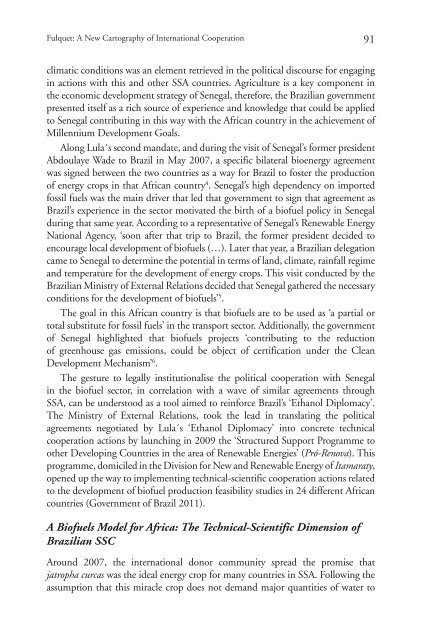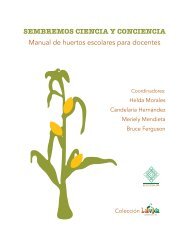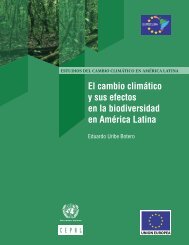Inequality and Climate Change Inégalité et changement climatique
Inequality
Inequality
You also want an ePaper? Increase the reach of your titles
YUMPU automatically turns print PDFs into web optimized ePapers that Google loves.
Fulqu<strong>et</strong>: A New Cartography of International Cooperation 91<br />
climatic conditions was an element r<strong>et</strong>rieved in the political discourse for engaging<br />
in actions with this <strong>and</strong> other SSA countries. Agriculture is a key component in<br />
the economic development strategy of Senegal, therefore, the Brazilian government<br />
presented itself as a rich source of experience <strong>and</strong> knowledge that could be applied<br />
to Senegal contributing in this way with the African country in the achievement of<br />
Millennium Development Goals.<br />
Along Lula´s second m<strong>and</strong>ate, <strong>and</strong> during the visit of Senegal’s former president<br />
Abdoulaye Wade to Brazil in May 2007, a specific bilateral bioenergy agreement<br />
was signed b<strong>et</strong>ween the two countries as a way for Brazil to foster the production<br />
of energy crops in that African country 4 . Senegal’s high dependency on imported<br />
fossil fuels was the main driver that led that government to sign that agreement as<br />
Brazil’s experience in the sector motivated the birth of a biofuel policy in Senegal<br />
during that same year. According to a representative of Senegal’s Renewable Energy<br />
National Agency, ‘soon after that trip to Brazil, the former president decided to<br />
encourage local development of biofuels (…). Later that year, a Brazilian delegation<br />
came to Senegal to d<strong>et</strong>ermine the potential in terms of l<strong>and</strong>, climate, rainfall regime<br />
<strong>and</strong> temperature for the development of energy crops. This visit conducted by the<br />
Brazilian Ministry of External Relations decided that Senegal gathered the necessary<br />
conditions for the development of biofuels’ 5 .<br />
The goal in this African country is that biofuels are to be used as ‘a partial or<br />
total substitute for fossil fuels’ in the transport sector. Additionally, the government<br />
of Senegal highlighted that biofuels projects ‘contributing to the reduction<br />
of greenhouse gas emissions, could be object of certification under the Clean<br />
Development Mechanism’ 6 .<br />
The gesture to legally institutionalise the political cooperation with Senegal<br />
in the biofuel sector, in correlation with a wave of similar agreements through<br />
SSA, can be understood as a tool aimed to reinforce Brazil’s ‘Ethanol Diplomacy’.<br />
The Ministry of External Relations, took the lead in translating the political<br />
agreements negotiated by Lula´s ‘Ethanol Diplomacy’ into concr<strong>et</strong>e technical<br />
cooperation actions by launching in 2009 the ‘Structured Support Programme to<br />
other Developing Countries in the area of Renewable Energies’ (Pró-Renova). This<br />
programme, domiciled in the Division for New <strong>and</strong> Renewable Energy of Itamaraty,<br />
opened up the way to implementing technical-scientific cooperation actions related<br />
to the development of biofuel production feasibility studies in 24 different African<br />
countries (Government of Brazil 2011).<br />
A Biofuels Model for Africa: The Technical-Scientific Dimension of<br />
Brazilian SSC<br />
Around 2007, the international donor community spread the promise that<br />
jatropha curcas was the ideal energy crop for many countries in SSA. Following the<br />
assumption that this miracle crop does not dem<strong>and</strong> major quantities of water to





